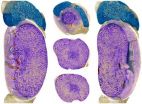(Press-News.org) About 75 percent of children with leukemia who take chemotherapy face life-threatening heart problems as they age, but an international study led by a University of Rochester Medical Center investigator shows that giving a cardio-protective drug during cancer treatment may prevent the damage.
Researchers and physicians will debate how to make young cancer patients and their families aware of the risks of heart damage, and the best ways to manage the risks, in a special session today at the American Society of Clinical Oncology (ASCO) meeting in Chicago.
Led by Barbara L. Asselin, M.D., professor of Pediatrics and Oncology at URMC, the study was sponsored by the Children's Oncology Group and the National Cancer Institute. It is believed to be one of the largest trials to evaluate the effectiveness of the drug Zinecard (dexrazoxane), at protecting the heart during treatment of acute lymphoblastic leukemia. Asselin presented data and will also take part in a larger ASCO forum, during which hundreds of pediatric cancer experts will discuss heart disease and second malignancies – the unfortunate, severe risks associated with aggressive treatment of children.
"Today the majority of children with leukemia will be cured," Asselin said. "As our young people survive, though, we believe we will see many more cardiac issues. It is a problem that must be fixed because it is the leading cause of death later in life among these patients."
One part of the equation involves getting teenagers and young adult cancer survivors, who tend to engage in riskier behaviors, to be aware of potential problems and make healthy lifestyle choices (no smoking; exercise; careful follow-up appointments with a physician), Asselin said.
Drugs such as Zinecard are also important, although the data so far has been inconsistent. The URMC study evaluated 537 patients for more than 10 years after they were treated for leukemia between 1996 and 2001. All received multi-agent chemotherapy that included doxorubicin, known to be toxic to the heart.
Patients were randomized to two groups, with or without a dose of intravenous Zinecard immediately prior to receiving the chemotherapy. Later, researchers assessed each patient for heart damage at three different points after chemotherapy. Using standard measures, they looked at heart muscle function and structure. (A common problem following doxorubicin therapy is heart enlargement and thinning of the ventricular walls.)
For both groups of patients, the five-year survival with no evidence of leukemia was the same. That data was encouraging and very important, Asselin said, because of concern in the pediatric community that adding Zinecard to the treatment regimen might interfere with the chemotherapy's ability to attack the leukemia.
In addition, the group that did not receive Zinecard had more episodes of acute heart problems, and researchers saw more damage over time to the heart structure and function, as compared to the group that did receive the cardio protective drug.
Earlier clinical trials of Zinecard in women with breast cancer, who had already received high doses of doxorubicin and needed more chemotherapy, showed that the drug could protect the heart during retreatment, Asselin said.
A problem with Zinecard, however, is that the URMC study also showed an increased rate of second malignancies in the children who received the heart drug. Although the higher rate did not reach conventional levels of statistical significance by research standards, it is worth noting and studying further, Asselin said.
One of the goals of the ASCO forum, in fact, will be to review all data on the use of the Zinecard and to debate the risks and benefits.
"We now have some very effective cancer treatments at our disposal," Asselin said. "But we really need to focus on promoting the good health of our survivors. Our care does not end with chemotherapy. Being there for many years into the future, and to help childhood survivors understand their risks, is so important."
### END
Drug might protect hearts of childhood leukemia survivors
2012-06-05
ELSE PRESS RELEASES FROM THIS DATE:
CallPro CRM Announces Integration with QuickBooks
2012-06-05
CallPro CRM announces its ability to integrate with QuickBooks, both the enterprise and cloud-based versions. QuickBooks is the most popular accounting software used by the U.S. SMB market. By enabling customers to integrate their CallPro CRM system with QuickBooks, CallPro CRM provides significantly added value.
Peter Connell, CEO of CallPro CRM says, "Many of our current clients are small to medium businesses. Since QuickBooks is so popular with these businesses we wanted to make sure we provided this functionality with CallPro CRM. Also, we hope to attract Intuit ...
High-contrast, high-resolution CT scans now possible at reduced dose
2012-06-05
Jointly released by ESRF - TU München and Synchrotron SOLEIL
Scientists have developed an X-ray imaging method that could drastically improve the contrast of computed tomography (CT) scans whilst reducing the radiation dose deposited during the scan. The new method is based on the combination of the high contrast obtained by an X-ray technique known as grating interferometry with the three-dimensional capabilities of CT. It is also compatible with clinical CT apparatus, where an X-ray source and detector rotate continuously around the patient during the scan. The results ...
Online Education Experts Release Groundbreaking Book on Distance Learning
2012-06-05
Dr. Marina Kostina and Dr. William LaGanza, online education experts, have released their first book together, The Golden Climate in Distance Learning, which promises to be unlike any previous books on distance learning. Early reviews have been positive, noting that the book is well researched, engaging, and ideal for serious online instructors and trainers.
The Golden Climate in Distance Learning addresses an essential dimension for distance learning teachers and trainers: How to BE with your students and trainees so as to increase their connectivity, engagement, enjoyment, ...
Teaching tree-thinking through touch
2012-06-05
Cambridge, Mass. - June 4, 2012 - A pair of new studies by computer scientists, biologists, and cognitive psychologists at Harvard, Northwestern, Wellesley, and Tufts suggest that collaborative touch-screen games have value beyond just play.
Two games, developed with the goal of teaching important evolutionary concepts, were tested on families in a busy museum environment and on pairs of college students. In both cases, the educational games succeeded at making the process of learning difficult material engaging and collaborative.
The findings were presented at the ...
Study examines models to improve care and reduce the high cost for Medicare beneficiaries
2012-06-05
It's well known that a relatively small percentage of chronically ill patients accounts for a disproportionate amount of health care dollars. Now, a multicenter study led by Johns Hopkins researcher Bruce Leff, M.D., might provide insights into how to cut Medicare costs while improving health care for older adults suffering from chronic health conditions.
Results of the study, published in the June issue of the journal Health Affairs, highlight the early efforts of the Medicare Innovations Collaborative, a joint program involving six health care-related organizations ...
FreeSlotsParadise.com: Online Leader in Free 3D Gaming
2012-06-05
Since the first casinos emerged online, video slot machines have been a driving force in the industry. Slots are charming, thrilling and fun to play. Slots have worldwide allure. Slots are also inviting and easy to learn, which makes them a great tool for attracting new players who might not otherwise take the plunge.
Online Slots and the Paradigm Shift
Recently, the industry experienced a paradigm shift: The slot machine was no longer solely the domain of the gambler. Gamers began flocking to video slots with arcade modes. Smartphone and tablet users are downloading ...
Are wider faced men more self-sacrificing?
2012-06-05
Picture a stereotypical tough guy and you might imagine a man with a broad face, a square jaw, and a stoical demeanor. Existing research even supports this association, linking wider, more masculine faces with several less-than-cuddly characteristics, including perceived lack of warmth, dishonesty, and lack of cooperation. But a new study suggests that men with these wide, masculine faces aren't always the aggressive tough guys they appear to be.
"Men with wider faces have typically been portrayed as 'bad to the bone,'" says psychologist Michael Stirrat. But he and David ...
Johns Hopkins' Hospital at Home program improves patient outcomes while lowering health care costs
2012-06-05
Using a Johns Hopkins-developed program that allows medical professionals to provide acute hospital-level care within a patient's home, a New Mexico health system was able to reduce costs by roughly 20 percent and provide equal or better outcomes than hospital inpatients, according to new research.
"Hospital at Home is an excellent model of care that can be implemented in a practical way by health delivery systems across the country and can have dramatic positive clinical and economic outcomes for patients and systems," says Bruce Leff, M.D., the Johns Hopkins professor ...
New Antidepressants Research Suggests Use During Pregnancy Could Lead to Early Labor, Infant Seizures
2012-06-05
The Rottenstein Law Group, which represents clients with claims stemming from injuries and birth defects caused by Selective Serotonin Reuptake Inhibitors (SSRIs) Zoloft and Paxil, has learned of research suggesting that pregnant women who take SSRIs to treat depression might be putting themselves at risk of going into earlier labor, or the rare occurrence of their newborn infants experiencing seizures.
According to a May 30 Reuters article, new findings published in the May 2, 2012 online edition of the American Journal of Obstetrics and Gynecology taken from a study ...
U of S researchers create powerful new tool for research and drug development
2012-06-05
A University of Saskatchewan research team led by Tony Kusalik and Scott Napper has harnessed bioinformatics and molecular biology to create powerful software that promises to become a "must have" tool in drug development research labs the world over.
The software is used to analyze kinases – a type of enzyme involved in virtually every cellular function, from energy use and reproduction to modifying gene expression. Licensing of the patented technology is currently underway, and a demonstration of its effectiveness recently appeared in the journal Science Signalling.
"This ...



